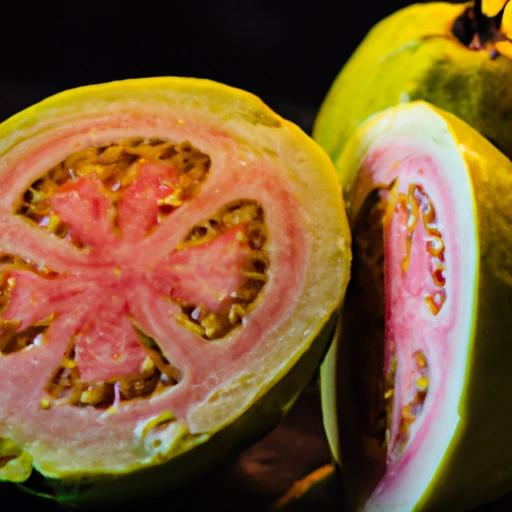Guava
Description

Guava is an exotic fruit known for its unique flavor and aromatic presence in culinary dishes around the world. It is a common tropical fruit that originates from various regions in Central and South America. The guava fruit ranges in color from light green to yellow on the outside, with a vibrant pink or white interior that is dotted with small, edible seeds. Guava is not only revered for its delicious taste but also for its versatility in recipes and substantial nutritional benefits.
Common uses
Guava is commonly used in a variety of culinary applications. It's consumed fresh or in the form of juices, jellies, jams, and preserves. Guava paste, a concentrated form of the fruit, is widely used as a sweet ingredient in pastries and desserts. Additionally, guava is utilized in savory dishes, sauces, and as a flavoring for candies and other confectioneries.
Nutritional value
Calories
A single guava fruit (about 55 grams or 1.94 ounces) contains approximately 37.4 calories.
Protein
Guavas are a good source of protein, with one fruit providing about 1.4 grams (0.05 ounces).
Fat
This fruit is low in fat, with a single guava containing around 0.5 grams (0.02 ounces) of fat.
Carbohydrates
Carbohydrates in a guava fruit amount to about 7.9 grams (0.28 ounces), making it a healthy source of energy.
Vitamins
Guavas are exceptionally rich in vitamin C, offering more than 200% of the daily recommended intake in a single fruit. They also contain notable amounts of vitamins A, E, and K, among others.
Minerals
The fruit provides essential minerals such as potassium, magnesium, and copper. A single fruit can contain about 229 milligrams (0.008 ounces) of potassium.
Health benefits
Guava is known for its health benefits, including boosting the immune system thanks to its high vitamin C content, improving heart health due to its potassium and soluble fiber, aiding digestion, and potentially lowering the risk of cancer. Its low glycemic index also makes it suitable for diabetics.
Potential risks
While guava is generally safe for consumption, individuals with a latex allergy may react to guava due to the presence of similar proteins. Moreover, eating too many guavas can lead to gastrointestinal discomfort due to the high fiber content.
Common recipes
Guava is used in a variety of recipes, including guava cake, guava BBQ sauce, and guava mojitos. It's also a favorite in fruit salads and smoothies.
Cooking methods
Guava can be eaten raw, boiled, or grilled. It is also commonly pureed for use in sauces and marinades, or cooked down into a paste or jam.
Pairing with other ingredients
Guava pairs well with flavors such as lime, honey, coconut, and vanilla. It also complements savory dishes with pork, chicken, or seafood.
Summary
Guava is a versatile and nutritious fruit with a rich historical background. Its applications span from sweet to savory dishes across various cuisines. With a dense profile of vitamins and minerals, guava offers numerous health benefits, making it a valuable addition to the diet. However, moderation is key to avoid any potential risks associated with its consumption. Whether used in a tropical-themed dessert or as an interesting twist to a traditional sauce, guava provides a delightful taste and aroma that enhances the flavor of many recipes.